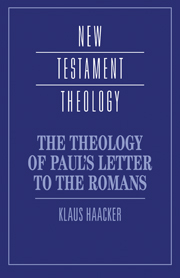Book contents
- Frontmatter
- Contents
- List of abbreviations
- 1 Introduction
- 2 Theology in a nutshell: The opening of the letter as a foretaste of what follows
- 3 Theology in process: An outline of the argument of the letter-body
- 4 Major concerns
- 5 Sorting the sources
- 6 To the Romans a Roman? The rhetoric of Romans as a model for preaching the Gospel in Rome
- 7 Romans in its canonical context
- 8 The impact of Romans and interactions with Romans in Church history
- 9 The relevance of Romans reconsidered
- Further reading
- Index of authors
- References
- Index of subjects
8 - The impact of Romans and interactions with Romans in Church history
Published online by Cambridge University Press: 05 June 2012
- Frontmatter
- Contents
- List of abbreviations
- 1 Introduction
- 2 Theology in a nutshell: The opening of the letter as a foretaste of what follows
- 3 Theology in process: An outline of the argument of the letter-body
- 4 Major concerns
- 5 Sorting the sources
- 6 To the Romans a Roman? The rhetoric of Romans as a model for preaching the Gospel in Rome
- 7 Romans in its canonical context
- 8 The impact of Romans and interactions with Romans in Church history
- 9 The relevance of Romans reconsidered
- Further reading
- Index of authors
- References
- Index of subjects
Summary
Every modern attempt to delineate the theology of Romans (as of the apostle Paul in general) is indebted to earlier interpretations. It is not only a matter of reading with eyes wide open what the text says, but also the product of a process of evaluation. Our emphasising or downgrading of what we read is not the casual effect of a moment but part of a history of understanding and transmitting the message of the ancient author. Therefore it is a matter of fairness to pay tribute to at least some highlights of the reading of Romans through the centuries. It can also teach us humility and make us ready to accept the shifts of emphasis which the next generation of scholars and expositors will propose as responses to the challenges of their time.
However, one caveat must be mentioned at the beginning. Our notion of a ‘theology of Romans’ (or of other writings of the New Testament) is a modern concept that did not exist in the minds of ancient or medieval Christian thinkers. Not even the idea of a ‘theology of Paul’ as distinct from or even in conflict with other ‘theologies’ of the New Testament had emerged before the rise of historical criticism. It is an offspring of the development in which Biblical studies were emancipated from the tutelage of dogmatic theology; in short, a product of the Enlightenment.
- Type
- Chapter
- Information
- The Theology of Paul's Letter to the Romans , pp. 150 - 161Publisher: Cambridge University PressPrint publication year: 2003

